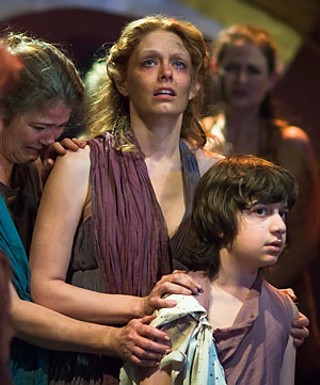Troades
This new adaptation of The Trojan Women is fueled by an earnestness that is the show's blessing and its curse
Reviewed by Robert Faires, Fri., March 28, 2008

Troades
The Vortex, through April 4
Running time: 1 hr, 55 min
The women come into view, weary and worn, the hems of their dun-colored shifts and gowns ragged, their bare feet and arms streaked with dirt. We can see that they have been through a struggle, and when men enter the scene, we see instantly what that struggle is. They wear leather skirts and carry spears, which they thrust at the women with the casual cruelty of one in control, the oppressor, the bully, the thug. Threatened, the women's faces stiffen in terror, but when the men leave, those faces go cold and harden like clay that has been through fire.
We recognize that look – or at least we should, given the times we live in. We have had the opportunity to see it every day for the five years our country has been in Iraq, to see it in newspaper photographs and television reports and images on the Web. And that's far from the only place we could have witnessed it in recent years; Afghanistan, Darfur, Bosnia, Somalia, Israel – from all those sites and more have come snapshots of those deadened faces fired by war. War is an intimate of our age, and the Vortex Repertory Company speaks to that tragic fact with a play that long ago spelled out the bitter toll that war always exacts. Bonnie Cullum's adaptation of The Trojan Women, with text by Susan Estelle Kelso and music by Vortex co-founder Sean T.C. O'Malley, sets us in Troy after the Greeks have laid waste to the city and its women await the news of their fate.
Led by Hekabe – an alternately despairing and defiant Patricia Wappner – these female survivors recall their suffering through the long siege of their city and its downfall, then are forced to endure new ordeals: orders that they be separated and enslaved; news that loved ones have died; the arrival of the hated Helene, whom they blame for the war, and her escape from their vengeance; the burning of Troy; the execution of a child. Misery is heaped upon misery, and the production strives to evoke these in all their tragic horror, with an earnestness that is the show's blessing and its curse. The earnestness fuels the ensemble with purpose, a kind of righteous fire, but it also sometimes leads the actresses to embroider their responses to their characters' misfortunes, to scowl and wail and grimace to a degree that comes across as showy more than felt. It's the difference between grieving and playing grief, and it pulls us out of the play.
The production is most effective at its simplest: when Wappner stands her ground and flashes steel in her eyes and voice, in the glimmers of humanity that Eric Porter brings to the conscience-stricken Greek warrior Talthybios, in a lone plaintive flute played by Joe England that wordlessly expresses the loss in this city and the hearts of these women, and, most of all, in the singing of the women themselves. Periodically throughout, the action ceases, the musical accompaniment falls away, and these women rise and join their voices as one in simple, elegant melodies and harmonies. Michael McKelvey's choral direction and the clear, strong voices of the actresses create a force that is greater than the sum of its parts: one that binds these Trojan women together and speaks for them all – and for all women wounded by war. It is the thing that brings us close to them and through which we know the devastation and suffering wrought by war. These beaten women sing, and we long for peace.










